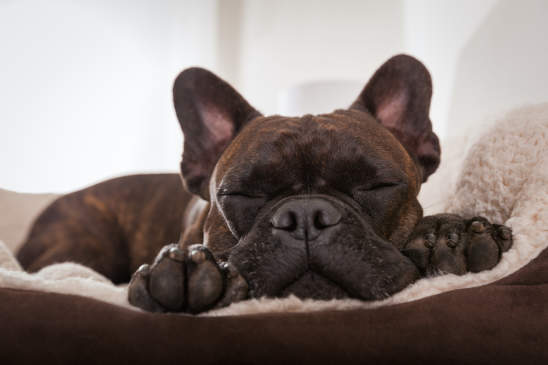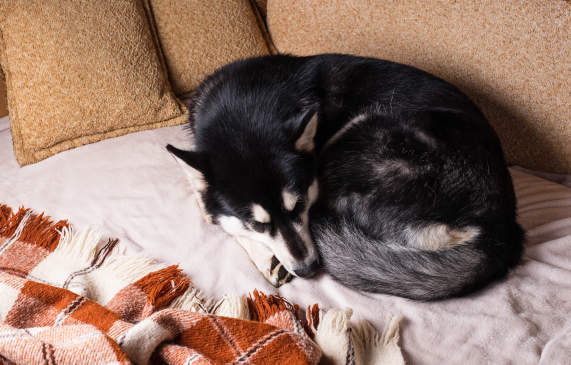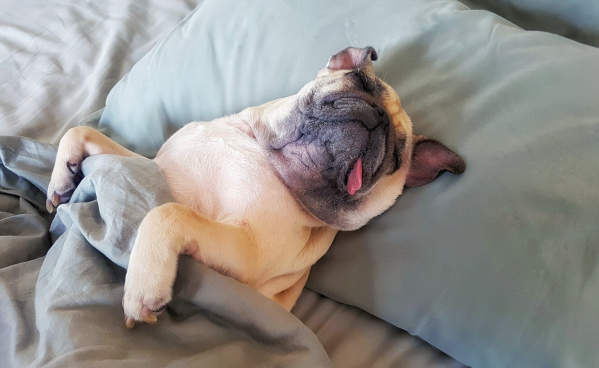Is it normal for your four-legged friend to laze around the majority of the day? Does it mean something more? Are they bored, depressed, or perfectly healthy? These are the questions that new and seasoned dog owners alike often ask themselves. Here’s what you should know.
How Much Sleep Does Your Dog Need?
According to the National Sleep Foundation, most dogs spend around 50% of each day — or 12 to 14 hours — sleeping. The average dog is active for only 20% of their day, and is awake (and lying around) for the other 30% of their day.
"Dogs will typically sleep when they’re not stimulated, as well as when their owner relaxes or sleeps," says Stephanie Liff, DVM, veterinarian and medical director at Pure Paws Veterinary Care in New York City.
Your lifestyle habits likely influence when your dog's up (like around dinnertime, begging for scraps) and when they laze around (like when you crash on the sofa and watch Netflix all afternoon).
However, your lifestyle isn't the only thing to impact your dog’s sleep.
Age
Both puppies and older dogs need more sleep than the average adult pooch. That's because their bodies need more time to rest and recover from all the extra activity. (They need to eat a lot more too!)
Puppyhood is the most active time in your dog’s life. As an adult dog becomes more senior, they’ll gradually become less active. This is normal, but keeping an aging dog active is essential to keeping them healthy. You might trade in long runs for short walks, but an active lifestyle leads to healthier sleeping habits.
Activity Level
Does your dog thrive on frequent walks in the park? Or is your pup more of a couch potato? According to the American Kennel Club (AKC), a puppy who is very active when they are awake may need as much as 18 to 20 hours of sleep every day. However, less active dogs will generally only sleep for 14 hours or so each day.
Regardless of how active your dog is, spreading out their physical activity throughout the day is the best approach to take. Dogs usually prefer to take frequent naps in order to recharge. So consider engaging them in activity for a few minutes multiple times a day as opposed to one long session.
"Stimulating your pet with an activity that is amenable to them is always helpful," Dr. Liff explains. "For example, a walk may be better suited than a run for an older dog. On the other hand, a young and social dog may do best with a visit to the dog park instead of solitary exercise."

Breed
Even though both small and big dogs alike can require a lot of sleep, larger dogs tend to sleep more on average. For example, Pyrenees and Newfoundlands often earn the nickname "mat dogs," as they seem to take an endless number of naps. Mastiffs are also known for their long and frequent naps.
Though smaller breeds like Bulldogs and even Shih Tzus often get called out for their droopy-eyed devotion to sleep, as well.
When To Ask Your Vet About Your Dog’s Sleep Habits
If you have questions or concerns about your dog’s sleeping habits, you should consult your vet. But there are a few things to keep in mind.
Changes In Sleeping Patterns
A dog that's lethargic due to illness is different from one that just enjoys sleeping. “If your dog simply sleeps a lot, that is not necessarily abnormal," says Liff. "Though if your dog starts to sleep more than normal, that can be a cause for concern.”
Another cause for concern is if your pet is unable to get comfortable. This could indicate possible orthopedic issues or respiratory distress. "These problems can lead to agitation when resting," says Liff.
"If you notice your dog’s sleeping patterns are changing, see your veterinarian," says Liff, as an underlying health condition may be causing your dog’s sleep issues.
Major Life Changes
Sometimes, changes in your dog's sleep schedule may be related to changes in their surroundings. Just like in humans, your dog's mood can impact their sleeping habits.

Have you moved recently? Introduced a new person or pet to the house? If your dog's environment has changed in some way, that could be the cause of a short-term change in habits, according to the Sleep Help Institute.
It's normal for a dog to act a bit differently in a new environment. Just like humans, you might find that stress or anxiety makes it harder for your dog to go to sleep.
Sweet Dreams!
If you notice your dog sleeping a lot, it's probably not cause for alarm. But, a sudden change in their sleep habits warrants a call to the vet. Keeping a close eye on your pet's routine will help you support a healthy and active lifestyle for them day in, day out.
